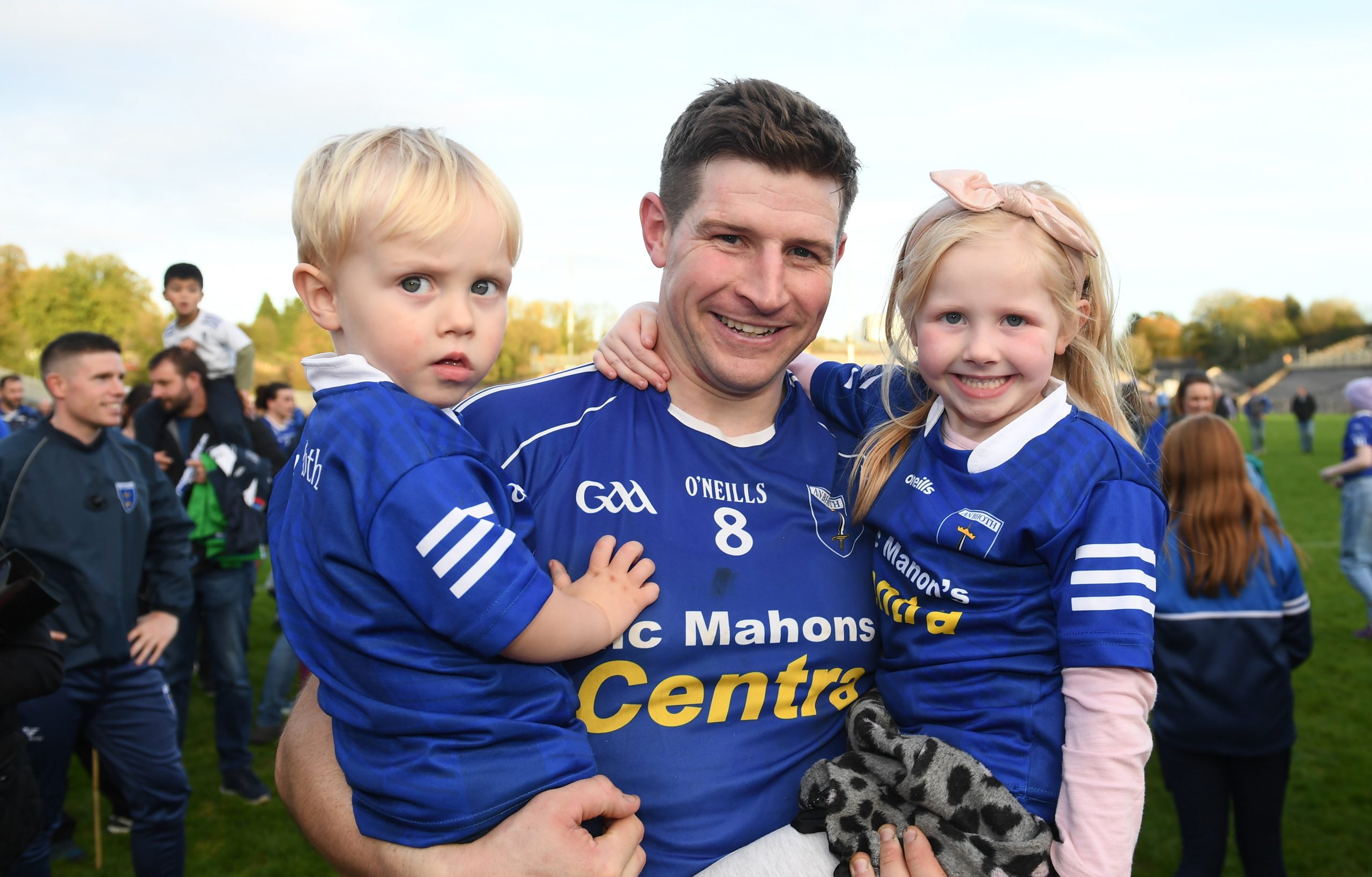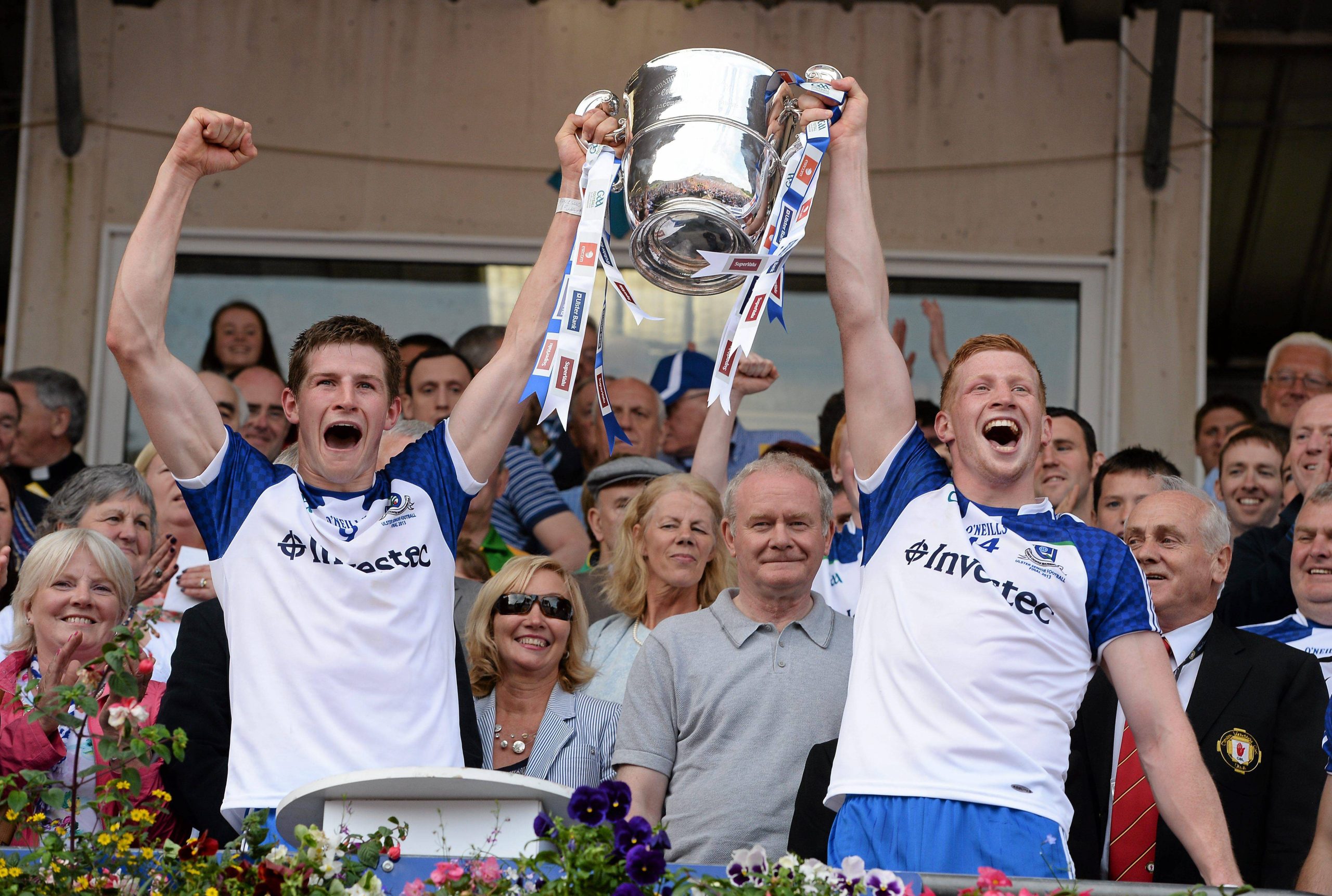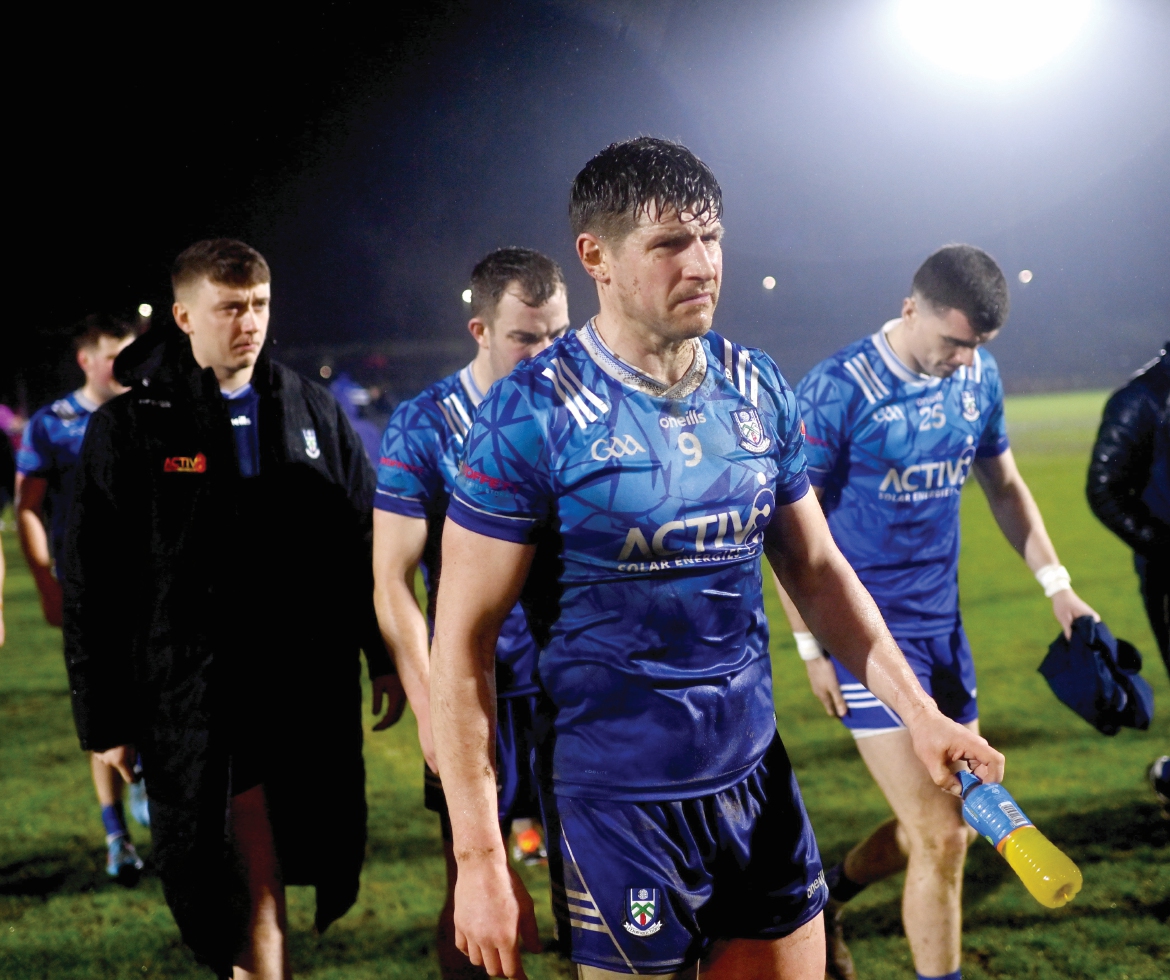Darren Hughes recently turned 38 and has played over 200 games for Monaghan. Niall McKenna remembers coaching him with Scotstown. Martin McElkennon looks back on is impact on Monaghan. They spoke with Michael McMullan…
FRANCIE and Patricia Hughes live at the far end of the parish. Too far to cycle or walk to Scotstown pitch. Community cornerstones, they always chipped into club life. They wanted their sons, Darren and Kieran, to play football. There was always a lift to training.
Fast forward to Sunday and Darren Hughes made his 201st appearance in a Monaghan senior jersey, coming in for Gary Mohan in Hyde Park. Another push towards two vital league points.
Rewind back to Scotstown u-10s and he didn’t stand out.
“He would have been light enough at that time,” Niall McKenna recalls. There wasn’t the strapping physique Gabriel Bannigan is looking at as the Farney men eye a Division One return.
“He did a lot of work himself and that, but you’d have never picked him out. I don’t think he was ever a county minor.”
In the Scotstown colours, there was a medal at u-12. That was the lot until u-21. By his mid-teens, Darren had a stint in goals. Something that would come back when the Monaghan SOS call came.
“I remember distinctly, one evening at the complex saying, ‘yeah, he’s full of football’, whatever he turns out to be,” McKenna said of the early shoots.
Scotstown hadn’t won a Monaghan senior title from 1993 by the time McKenna, Sean McCrudden and Ronnie McDermott stepped into the management gig in 2009. A famine.
In the same window, McKenna recalls leafing through a championship programme in Clones and Scotstown nobody on the minor squad.
By u-21, a crux of players formed a winning team that offered hope of the senior success that has flooded in since.

MY DADDY…Darren Hughes pictured with his children Cillian and Ava after helping Scoststown to glory
There was a culture of socialising but Hughes was at the forefront of changing the focus. The u-21 success was combined with what he was picking up with the county seniors.
“You could see a change of their mindset in Scotstown,” McKenna said. “They were going away from their enjoyable weekends, putting more effort in and looking after themselves better.”
They lost the 2011 senior final to Owen Duffy’s stoppage time winner for Latton but the Scotstown team was coming. They doubled down on their efforts and were champions two years later. They’ve been in every final since.
“I think when it came to 2013, when they won the championship, none of them drank for 90 days,” McKenna said.
“I’d say Darren and Donal Morgan would have been at the back of that, changing the attitude of players.”
On the county scene, Hughes became a mainstay of the Farney force on their way to two Ulster titles and a sustained spell in Division One.
The inter-county scene is a busy one. All-consuming in many ways, but Hughes never forgot his roots.
If medals needed presented to a Scotstown youth team, he’d always be available. The same if there was a golf classic that needed backing. The answer was always yes.
On a night off county training, he’d be looking on from the sideline. Moral support. Leading by example. Call it what you want, but the young players would soon see what commitment looked like.
McKenna uses it as the key attribute that took Hughes from a lightweight underage player to one of the club’s best ever players.
“He was very committed to being better, I definitely think that was it,” he said. Everything fell into place.
While his younger brother Kieran may have had more natural talent, Darren worked at his game like few others. He wanted to excel.
In McKenna’s eyes, on the pitch, Darren has always delivered. An eight out of 10 player every week. Those soldiering beside him knew what he’d give. He remembers him giving Brendan Rogers a tough hour against reigning Ulster champions Sleacht Néíll in Clones.
“He’d be up there as one of the best players the club has ever produced,” McKenna offers. A big speak of a club with 23 county titles.
“He was great to work with. He’d have helped the management, in that, what he saw at the county, he’d have brought it back to the club. He showed the example of what needed done to be a winner.”
It was the perfect fit. Young players came into the club team and had someone to follow. Men like Hughes. Men like Donal Morgan and Francis Caulfield.
With their standards, it took care of the discipline issues. Drinking. Punctuality. Commitment. Players were told what was expected of them. Either they were in or they were out and the manager could focus on a plan to win games.
“The only thing I’d like to add about him, I’d love to see another one,” McKenna said of Darren Hughes.
“We used to slag his mother and ask her had she any more coming because the two she sent us were good ones.”
***
IT’S 2010. Sunday, June 6 to be precise, in Monaghan’s Westenra Hotel. The Farney men are assembling before a trip to Casement Park for an Ulster quarter-final clash with Armagh.
When the squad departed their final training session days earlier, Darren Hughes was named at full-back. Shane Duffy in the number one jersey. Then everything changed with an injury to Duffy.
Martin McElkennon was coaching the team under manager Seamus McEnaney. Speaking now, he uses unique as the word to describe Darren Hughes.
“When I was there, he’d have been playing at times at full-back,” McElkennon continued. “There’d have been times that he’d have been centre-back. He could have played midfield. He could have played half-forward.”
On that June morning, the Monaghan management met. The idea of Hughes stepping in as goalkeeper was floated. But they’d have to ask him first.
“My memory was Seamus taking him into the room with myself and Paul Grimley,” McElkennon said. Hughes offered a simple answer. Two words.
“No problem,” came the reply. That was that. He didn’t so much as flinch. Monaghan came first. The fact he’d have been mentally preparing for a marking job in defence was just by the by.
This was a million miles away from Monaghan now where Rory Beggan is out of the goals more often than he is in.
“My memory was that he played in that game and was superb,” McElkennon said of Hughes answering the call in a convincing win.
“He certainly had a massive impact. His kick-outs were brilliant. His fielding in the box, stops and all the rest.”
Later that night, when McElkennon flicked on the tellyto pick through the action, he recalled the pundits questioning the decision. Putting their full back in goals. What planet were they on?
“That’s how I would describe him as unique,” he said of Hughes. “You don’t get that sort of player anymore. Most of the players are gone by maybe their early 30s because of the amount of training they’re being asked to do now.”
Add in a decade of Scotstown dominance. County to club, an extended season before reverting to the county squad. Rinse. Repeat.
“You have to hand it to him,” stressed McElkennon, who came into the Farney scene in 2006 and remembers Hughes as an u-21.
“The commitment that Darren has been putting in year in, year out, it’s phenomenal that he’s been able to do that.”
Getting to 200 senior appearances for Monaghan isn’t to be sniffed at. It screams commitment and longevity from the rooftops. Factor in a spate of injuries, the latest coming against Cavan last year. Off on a stretcher.

BROTHERS IN ARMS…Brothers Darren and Kieran Hughes with the Anglo Celt Cup in Clones
It would’ve have retired many men. Not Darren Hughes. Different gravy. Every rehabilitation programme was followed to the last detail.
“You always got the impression with Darren that there was life outside football too,” McElkennon added.
“He was a farmer and so he probably was one of these lads that gave everything he could to football but there was the other side of him.
“He got away from football, did his work and worked hard. I think that probably wasn’t a bad thing for him, that he didn’t build his whole life around football.”
Manual graft did him no harm either. Natural toughness took him a long way. Days in the open air and the freshness it brought. Up and at it.
As someone who trained teams at the highest level, McElkennon surmises what a programme would look like for the 2025 version of Darren Hughes. Mileage and yards would be carefully calibrated Rest. Injury prevention. Balancing the load.
“It’s a pity so many players are walking away nowadays at an early age,” he points out.
“At 31 or 32, if your training’s curtailed right, and there’s not this notion that everybody must be doing the same, and you’re really looking after the player, and making him ready for that game, then I definitely think that people can learn more from that.”
Hughes came in with McEnaney from the start, in the winter of 2006. McElkennon was the man running the sessions. How did he read Darren Hughes in the middle of a training session? Straightforward.
“Solid is the word you would probably use for him,” he expanded. “In every team, there’s always players that you can trust.
“You always knew what you would always get from them. Yeah, they might make mistakes, they might kick a wide but they always gave you everything.
“Darren was one of those players. Even though he was quite young, you knew there was a solid approach about him.”
Nothing was ever a bother. There were no nerves. He never put himself first. The team was number one. In that, there is something to learn.
“He was a real players’ player,” McElkennon said, beginning to sum up. “As a management team, those were the people that you look back and you have great time for.
“They didn’t throw the toys out of the pram. They just got on with things. Darren Hughes definitely had that in him. You could see that in spades.”
There were setbacks. Injuries. Defeats. Times of reflection. The next chapter was always the same. There was always a way back.
“If there was an All-Star for what Darren Hughes has given to county and club,” he questioned.
“If you’d measured it that way, rather than just a couple of big games in certain matches, this guy’s definitely somebody that deserves more than most for what he has done”
Why is he so flexible? He had all the tools. His handling skills were exemplary, allowing him to play anywhere in the spine.
There was bravery and honesty. McElkennon can still see him throwing his body into block a ball, right down on an opponent’s boot.
“Darren has great feet on him,” he added. “He’d run though and bang, the ball would be in the back of the net. His timing was brilliant.
“The way the game unfortunately had gone over the last number of years, Darren Hughes was nearly a throwback.
“All the things we loved about Gaelic football, in the early 90s, he had them and that’s why probably he’s still such a big player.
“I have no doubt he could still play in about four or five central positions and he could still do that job as well as anybody.
“He’s just a very, very clever footballer. There was never a problem with him, always a great lad to work with.”
At u-10 level, he was just another player bobbing about at training. Three decades later, Darren Hughes is someone every team needs. A footballing warrior.
Receive quality journalism wherever you are, on any device. Keep up to date from the comfort of your own home with a digital subscription.
Any time | Any place | Anywhere












